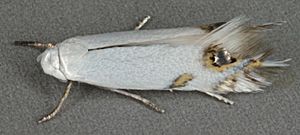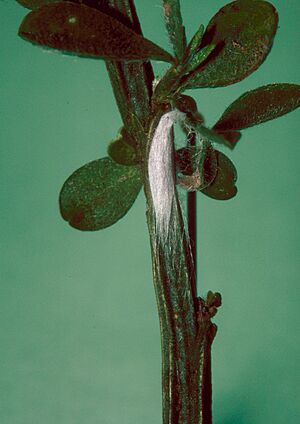Scotch broom twig miner facts for kids
Quick facts for kids Leucoptera spartifoliella |
|
|---|---|
 |
|
| Leucoptera spartifoliella Borras Quarry, North Wales | |
| Scientific classification | |
| Kingdom: | |
| Phylum: | |
| Class: | |
| Order: | |
| Family: |
Lyonetiidae
|
| Genus: |
Leucoptera
|
| Species: |
L. spartifoliella
|
| Binomial name | |
| Leucoptera spartifoliella (Hübner, 1813)
|
|
| Synonyms | |
|
|
The Leucoptera spartifoliella is a tiny species of moth. It belongs to the family Lyonetiidae. People often call this moth the Scotch broom twig miner. It is special because it helps control a harmful plant. This moth is used as a type of biological pest control. It helps fight against a plant called Scotch broom. Scotch broom is considered a noxious weed, meaning it is a plant that causes problems.
Contents
About the Scotch Broom Twig Miner Moth
What Does This Tiny Moth Look Like?
The adult Leucoptera spartifoliella is a very small moth. It is usually white and measures about four millimeters long. This is roughly the size of a small grain of rice.
Life Cycle of the Moth
The female moth lays her eggs one at a time. She places them on the stem of the Scotch broom plant. This plant is the moth's host plant. This means it is the only plant the moth's young can eat.
Once an egg hatches, a tiny larva emerges. This larva then burrows into the stem of the Scotch broom. It lives and eats inside the outer layer of the stem, called the epidermis. The larva stays inside the stem for almost a year. While it eats, it causes damage to the plant. After this long period, the larva changes into a pupa. This is a resting stage before it becomes an adult moth.
Helping Control Weeds
The Scotch broom twig miner moth was brought to California in 1960. The goal was to help control the spread of Scotch broom there. Since then, the moth has made its home in parts of the western United States.
In 1990, the moth was also introduced to Australia for the same reason. Scientists are still studying how well this moth works to control Scotch broom. The insect does cause a lot of damage to the plants. However, the plants can often recover from this damage. Many plants die when the insect's damage makes them weak. This weakness can then make them more likely to get diseases. Because of this, scientists are also looking for other ways to control Scotch broom.
The moth also arrived by accident in New Zealand in the 1950s. It has since become established there. The moth has caused parts of the Scotch broom plants to die off in different areas across the country.
 | Emma Amos |
 | Edward Mitchell Bannister |
 | Larry D. Alexander |
 | Ernie Barnes |


